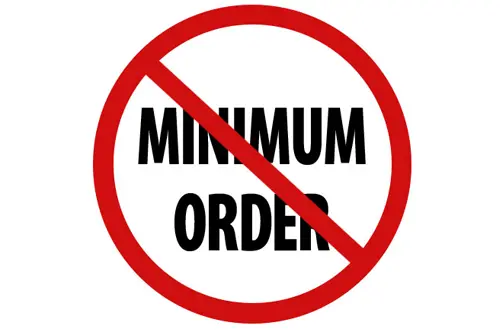How No Minimum Order Quantity Helps Explore New Market Opportunities
Minimum order quantities limit a company's ability to test new products or enter new markets. Companies may be unwilling to take on large inventories because they are unsure of the market response, thereby missing out on some market opportunities.
What does MOQ mean?
In business and supply chain management, MOQ stands for Minimum Order Quantity, which refers to the minimum order quantity requirements of a supplier or manufacturer for a certain product or service. This helps suppliers ensure adequate profits and production efficiency, reduce unit costs, improve supply chain stability, and attract more buyers.

For individuals and small and micro businesses, due to low demand, the minimum order quantity(MOQ) means they must purchase more goods than they actually need, increasing unnecessary costs. This includes not only the cost of the goods themselves, but also costs such as warehousing, insurance and transportation. For small businesses or new entrepreneurs, if logistics service providers set minimum order quantities, it may increase their economic pressure, leading to capital tying up and inventory backlog.
Setting a minimum order quantity may limit user flexibility. They may be forced to abandon certain orders because they do not need large quantities of goods, which may affect their supply chain management and business expansion plans.
The impact of setting MOQ on logistics and transportation services
customer churn
The minimum order quantity causes trouble to users, and some users may choose to switch to other more flexible logistics service providers. This can lead to customer churn, negatively impacting the business.
Market competitiveness declines
Providing flexible and user-friendly services is key to attracting and retaining customers. Setting minimum order quantities may put logistics service providers at a disadvantage compared with other, more flexible competitors.
Income fluctuations
This leads to fluctuations in the income of logistics service providers. When demand is small or unstable, logistics service providers may have difficulty meeting minimum order requirements, thus affecting their overall revenue.
No minimum order quantity breaks the traditional minimum order requirement and allows users to purchase goods on demand, regardless of quantity. It can lower the delivery threshold for users and improve the popularity and convenience of logistics services.
Chinadivision logistics service providers provide more flexible services to meet the needs of different users by weighing the pros and cons. At the same time, users also need to understand these limitations and find the logistics solution that best suits their needs.
chinadivision No order limit requirements bring benefits to enterprises
Achieve flexible logistics
The introduction of the no minimum order policy has brought good news to small and micro enterprises. Regardless of the size of the order, companies can deliver goods according to actual needs. There is no need to worry about additional costs incurred due to failure to meet the minimum order quantity, providing a more flexible logistics solution for small and micro businesses.
Since there is no need to wait for orders to accumulate to the minimum order quantity, companies can respond to market demand more quickly and seize business opportunities. At the same time, the delivery plan can be flexibly adjusted according to actual sales conditions to avoid the risk of inventory overstock and slow sales.
Flexible pricing
Enterprises can adopt a flexible pricing strategy and set prices based on the user's order quantity. No matter how many items users purchase, they can get reasonable prices, thus lowering the purchase threshold for users.
Green Logistics
The no minimum order quantity policy can also promote the rational use of logistics resources and reduce waste. The positive role of the one-piece delivery model in reducing empty shipping rates and reducing carbon emissions promotes the sustainable development of the logistics industry.
Set up purchase discount policy
When the purchase quantity reaches a certain level, discounts or some products will be given as gifts. Users are encouraged to increase their order quantity while enjoying more discounts, thereby improving user satisfaction. At the same time, it can also be purchased in stages, breaking down bulk commodities into small units, allowing users to purchase in stages.
Diversified delivery methods
In order to meet the needs of different users, companies can provide diversified delivery methods, such as express delivery, self-pickup, store pickup, etc. You can also directly outsource to a professional third-party logistics transporter. This is the simplest method. Users can choose the most suitable delivery method according to their actual situation, which improves the flexibility and convenience of logistics services.
What impact does no MOQ have on improving logistics services?
No minimum order quantity lowers the ordering threshold for consumers and improves shopping convenience by lowering the ordering threshold, improving logistics efficiency, promoting supply chain optimization, and enhancing brand image and competitiveness, thereby stimulating consumers' desire to buy. , increasing the order volume of logistics services.
By breaking the traditional minimum order quantity requirements, lowering the purchase threshold for users, and improving the popularity and convenience of logistics services, it can effectively improve users' shopping experience and satisfaction, and promote the growth of corporate sales performance.
PIL issued a notice
From now on, all cargo containing lithium batteries, regardless of lithium content, must be declared as dangerous goods when imported or exported to areas covered by PIL's route network.
All transported lithium batteries must be new and sealed, damaged, replaced or reinstalled batteries will not be accepted.
For used lithium batteries, they must be completely discharged, that is, completely dead batteries.





